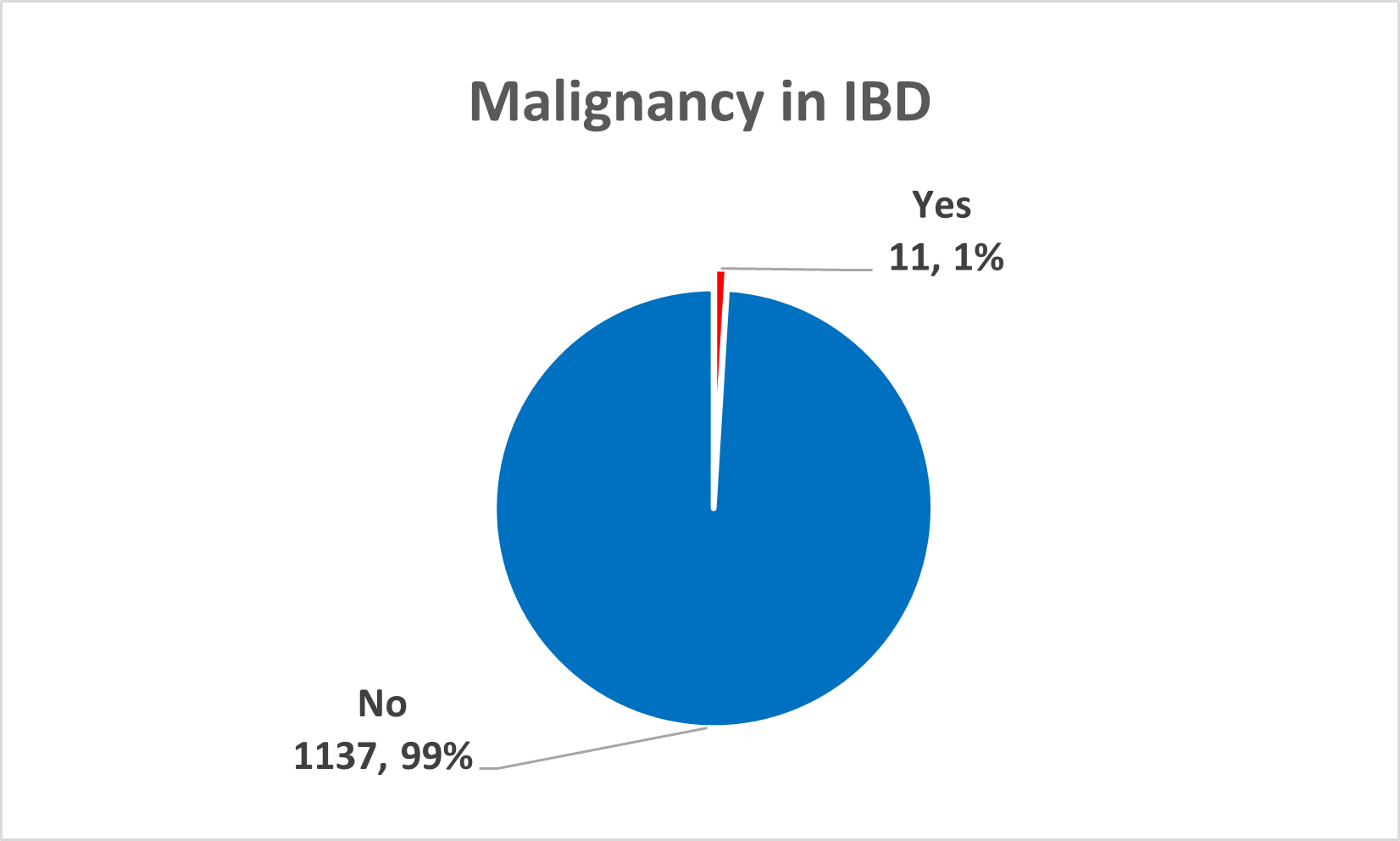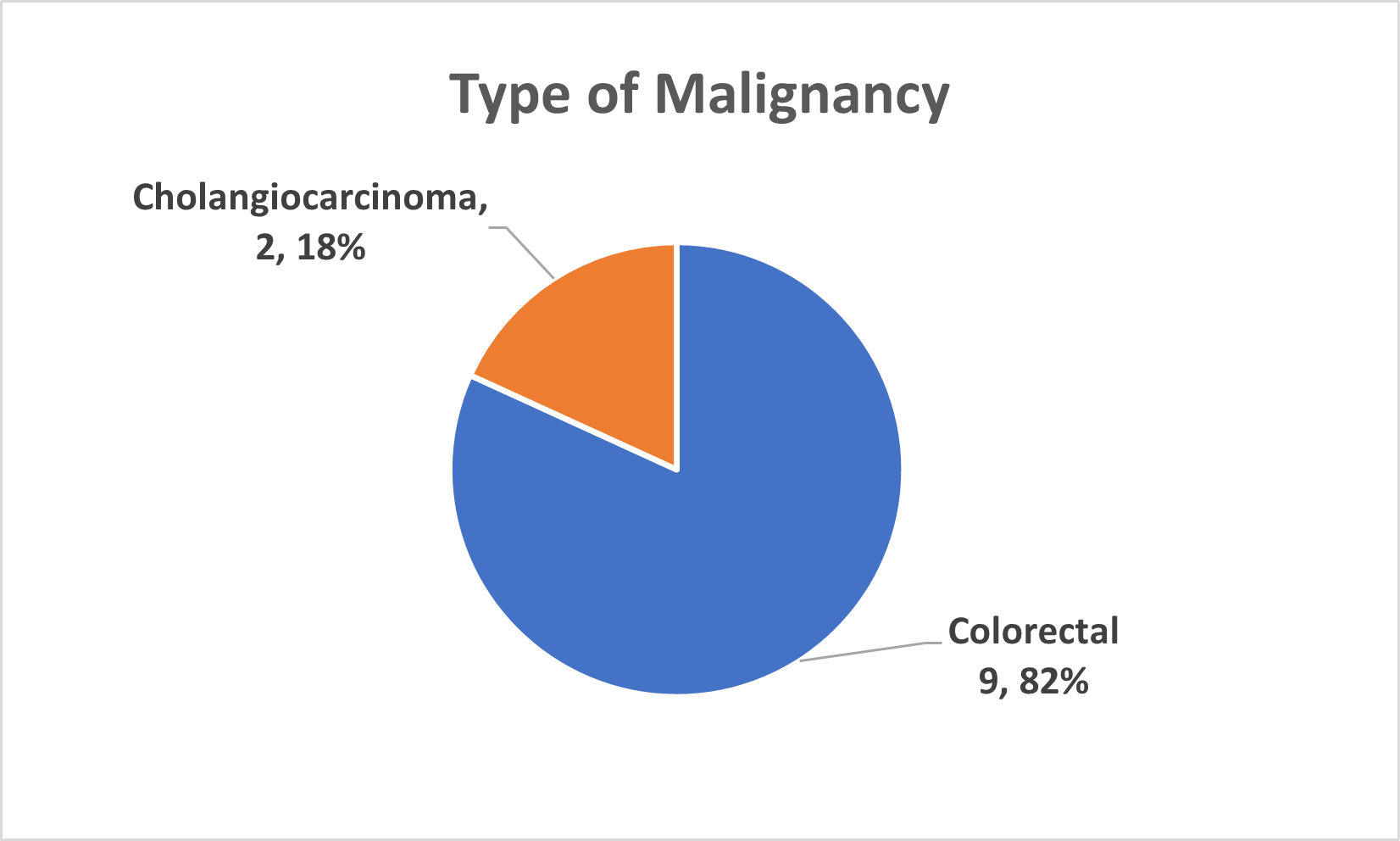Monday Poster Session
Category: IBD
P3322 - The Incidence of Malignancy in Inflammatory Bowel Disease: The Experience at Cleveland Clinic Abu Dhabi, a Large Tertiary Hospital in United Arab Emirates
Monday, October 27, 2025
10:30 AM - 4:00 PM PDT
Location: Exhibit Hall

Fatma Mahmoud, MD
Cleveland Clinic Abu Dhabi
Abu Dhabi, Abu Dhabi, United Arab Emirates
Presenting Author(s)
Fatma Mahmoud, MD1, Doa’a Alkhader, MD1, Jude Al Haddad, MD2, Zaher Koutoubi, MD1
1Cleveland Clinic Abu Dhabi, Abu Dhabi, Abu Dhabi, United Arab Emirates; 2Royal College of Surgeons in Ireland, Bahrain, Ash Shamaliyah, Bahrain
Introduction: Inflammatory bowel diseases (IBD) are chronic inflammatory conditions of the gastrointestinal tract. IBD is associated with increased risk of malignancies particularly colorectal cancer. Inflammation and immunosuppression are two major risk factors for the development of carcinogenesis in inflammatory bowel disease (IBD). Individuals with IBD are at increased risk for several malignancies originating in the intestine, such as colorectal cancer or extraintestinal malignancies such as hepatobiliary and pancreatic malignancies. However, data on the incidence of malignancy in IBD patients in the Middle East, particularly in the UAE, remain limited. This study aims to evaluate the incidence of malignancies among IBD patients from a patient registry at a tertiary hospital in Abu Dhabi over a 9-year period.
Methods: A retrospective cohort study was conducted using data from the IBD registry of a tertiary hospital in Abu Dhabi. A total of 1,148 IBD patients, with a mean age of 35.5 years, were included. Patients diagnosed with IBD (CD or UC) between March 2015 and June 2024 were assessed for malignancies. Data on demographics, disease characteristics, smoking status, family history of IBD, malignancy incidence, age of diagnosis and ethnicity were collected. The primary outcome was the incidence of malignancy, stratified by cancer type and its association with disease subtype.
Results: A total of 11 patients were identified with malignancies. The overall risk of malignancy was estimated to be 1% with an average age of 48 at diagnosis. Of these, 9 (82%) had UC and 2 (18%) had CD. The malignancies included 9 cases of colorectal cancer and 2 cases of cholangiocarcinoma. No extra-intestinal malignancies were found among our patients’ cohort. UC patients exhibited higher malignancy rates than CD patients (p=0.008). Logistic regression analysis identified age as a significant predictor of malignancy, with an odds ratio of 1.066 (p=0.002). No statistically significant correlation was found between sex, nationality, family history, smoking, and malignancy risk.
Discussion: The incidence of malignancy in this IBD cohort, while relatively low at 1% with colorectal cancer being the most frequent type, it is more common in UC than CD, and more frequent in males than females. It highlights the importance of vigilant regular cancer screening, particularly for colorectal cancer in patients with IBD.

Figure: Out of 1148 patients with IBD in our registry, 11 were diagnosed with malignancy yielding a prevalence rate of 0.958%.

Figure: Colorectal cancer (CRC) was the most commonly observed malignancy, with 9 cases (0.78%), followed by cholangiocarcinoma, which was reported in 2 cases (0.17%).
Disclosures:
Fatma Mahmoud indicated no relevant financial relationships.
Doa’a Alkhader indicated no relevant financial relationships.
Jude Al Haddad indicated no relevant financial relationships.
Zaher Koutoubi indicated no relevant financial relationships.
Fatma Mahmoud, MD1, Doa’a Alkhader, MD1, Jude Al Haddad, MD2, Zaher Koutoubi, MD1. P3322 - The Incidence of Malignancy in Inflammatory Bowel Disease: The Experience at Cleveland Clinic Abu Dhabi, a Large Tertiary Hospital in United Arab Emirates, ACG 2025 Annual Scientific Meeting Abstracts. Phoenix, AZ: American College of Gastroenterology.
1Cleveland Clinic Abu Dhabi, Abu Dhabi, Abu Dhabi, United Arab Emirates; 2Royal College of Surgeons in Ireland, Bahrain, Ash Shamaliyah, Bahrain
Introduction: Inflammatory bowel diseases (IBD) are chronic inflammatory conditions of the gastrointestinal tract. IBD is associated with increased risk of malignancies particularly colorectal cancer. Inflammation and immunosuppression are two major risk factors for the development of carcinogenesis in inflammatory bowel disease (IBD). Individuals with IBD are at increased risk for several malignancies originating in the intestine, such as colorectal cancer or extraintestinal malignancies such as hepatobiliary and pancreatic malignancies. However, data on the incidence of malignancy in IBD patients in the Middle East, particularly in the UAE, remain limited. This study aims to evaluate the incidence of malignancies among IBD patients from a patient registry at a tertiary hospital in Abu Dhabi over a 9-year period.
Methods: A retrospective cohort study was conducted using data from the IBD registry of a tertiary hospital in Abu Dhabi. A total of 1,148 IBD patients, with a mean age of 35.5 years, were included. Patients diagnosed with IBD (CD or UC) between March 2015 and June 2024 were assessed for malignancies. Data on demographics, disease characteristics, smoking status, family history of IBD, malignancy incidence, age of diagnosis and ethnicity were collected. The primary outcome was the incidence of malignancy, stratified by cancer type and its association with disease subtype.
Results: A total of 11 patients were identified with malignancies. The overall risk of malignancy was estimated to be 1% with an average age of 48 at diagnosis. Of these, 9 (82%) had UC and 2 (18%) had CD. The malignancies included 9 cases of colorectal cancer and 2 cases of cholangiocarcinoma. No extra-intestinal malignancies were found among our patients’ cohort. UC patients exhibited higher malignancy rates than CD patients (p=0.008). Logistic regression analysis identified age as a significant predictor of malignancy, with an odds ratio of 1.066 (p=0.002). No statistically significant correlation was found between sex, nationality, family history, smoking, and malignancy risk.
Discussion: The incidence of malignancy in this IBD cohort, while relatively low at 1% with colorectal cancer being the most frequent type, it is more common in UC than CD, and more frequent in males than females. It highlights the importance of vigilant regular cancer screening, particularly for colorectal cancer in patients with IBD.

Figure: Out of 1148 patients with IBD in our registry, 11 were diagnosed with malignancy yielding a prevalence rate of 0.958%.

Figure: Colorectal cancer (CRC) was the most commonly observed malignancy, with 9 cases (0.78%), followed by cholangiocarcinoma, which was reported in 2 cases (0.17%).
Disclosures:
Fatma Mahmoud indicated no relevant financial relationships.
Doa’a Alkhader indicated no relevant financial relationships.
Jude Al Haddad indicated no relevant financial relationships.
Zaher Koutoubi indicated no relevant financial relationships.
Fatma Mahmoud, MD1, Doa’a Alkhader, MD1, Jude Al Haddad, MD2, Zaher Koutoubi, MD1. P3322 - The Incidence of Malignancy in Inflammatory Bowel Disease: The Experience at Cleveland Clinic Abu Dhabi, a Large Tertiary Hospital in United Arab Emirates, ACG 2025 Annual Scientific Meeting Abstracts. Phoenix, AZ: American College of Gastroenterology.
